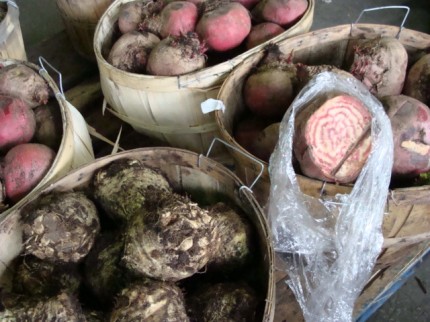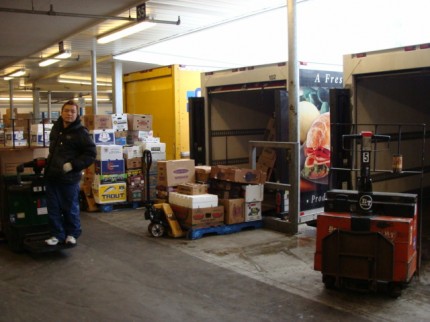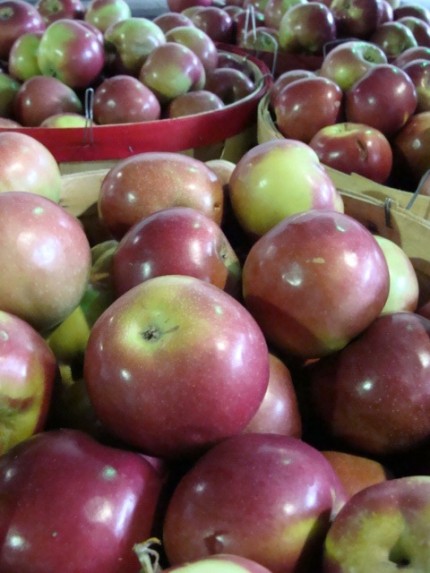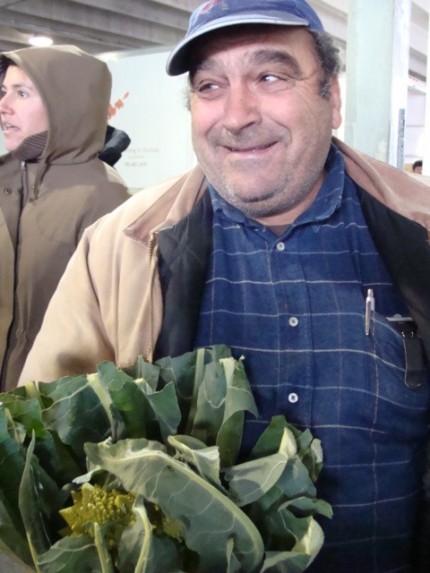The Ontario Food Terminal: a visit to the TSX of fruits and vegetables
Posted: December 6, 2010
Categories: Food in the News
When I arrive at the Ontario Food Terminal (OFT), huddled into a tiny room at the top of the security tower with various other foodies, I am informed by GM Bruce Nicholas that I am now in the “reality zone”. With a daily influx of 5.1 million pounds of fresh fruits and vegetables, supplying 30-35% of Toronto’s produce, the OFT is indeed, as Nicholas describes it, the stock exchange of fruits and vegetables.
Bushels of beautiful striped beets
I am here through the invitation of the Toronto Youth Food Policy Council; the OFT is generally not open to the public, and as we step inside I can see why. With 100,000 square feet of cold storage space, a massive warehouse, a farmers market and thousands of employees, the OFT is the largest wholesale fruit and vegetable distribution centre in Canada and is frequented by 400 farmers and 5000 buyers. Not an easy feat when you consider that the board consists of only 36 employees and that this public entity takes no money from the government and hasn’t since its inception in 1954.
An average day here starts at around 4am, when trucks filled with organic and conventional fruits and vegetables start rolling in from all over North America. Â Produce travels from Florida in 48 hours and from California and Mexico in 72 hours. The OFT offers buyers products from all over the world as well as from Ontario farms.
A worker loading trucks with fresh produce
Bushels of Macintosh apples
Many people have gripes about the OFT: it is sometimes argued that the produce it supplies is faceless, unable to provide consumers with the wealth of knowledge obtainable at a farmers market. Nicholas would argue otherwise. The top priority, he says, is supplying Ontario with local food. If farmers supplying farmers markets want to supplement their harvest with fruits or vegetables from farmers selling at the OFT, he contends, why shouldn’t they? The situation is not certainly not ideal, but if it means more local food consumption, Nicholas argues it is worth the compromise.
Ontario Food Terminal General Manager Bruce Nicholas
Farmer Tony Martns proudly shows off his romanesco at the OFT farmers market
Another point Nicholas wants to make clear is that the OFT allows smaller stores and farmers to compete with huge chain stores and large-scale farmers. When he asks me where I buy my groceries, I admit with a red face that I sometimes buy from chain stores if I cannot make it to a farmers market or an organic store; I am promptly berated for this. Chain stores, Nicholas argues, are in the business of predatory selling, offering products for much cheaper than small groceries can afford and essentially waiting them out.
Nicholas is clearly proud of his role in providing green grocers with quality produce to give them the chance to compete. Â And while his organisation imports a vast amount of produce, he is clearly well aware of the importance of local food procurement. Â With a system so successful that it is visited by emulators from all over the world, it is commendable that the OFT seems dedicated to promoting local food and supporting small-scale farmers and grocers.





